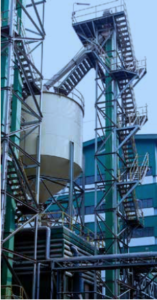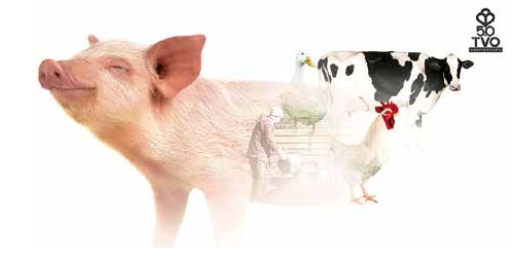The term “fat” (animal or vegetable) is a synonym for lipid in human and animal diets. It is essential for both human and animal nutrition. Fat supplementation is recognized as a
valuable method for meeting the high energy requirements of rapidly growing young animals, especially broiler chickens and small piglets. Besides the obvious advantages of being high in caloric density, fat has also been observed to exert an “extra caloric” effect characterized by enhanced utilization of energy in the diet.
Advantages of added fat in feed:
1. Enhanced utilization of dietary energy. This effect is apparently due to:
a. Decreased rate of passage and there-fore improved digestion and intestinal absorption
b. Synergistic enhancement of saturated fatty acid absorption in the presence of unsaturated fatty acids in basal diet
c. Lowered heat increment of the supplemented diet resulting in improved utilization of metabolizable energy
d. In addition to these energetic effects, fat may improve the physical characteristics and palatability of the diet to an extent that it promotes increased feed consumption
 2. Increase growth performance and production
2. Increase growth performance and production
3. Provides essential fatty acids (EFA)
4. Fat is a concentrated source of energy, when added to diets it has been shown to increase stamina
5. Improves the absorption of fat-soluble vitamins, carotenoid pigments and all essential active ingredients (antioxidants)
6. Addition of fat in diets, besides supplying energy, reduces fines and broken pellets while at the same time increasing palatability and the efficiency of energy consumption with lower caloric increment
7. Dust control, improved formula density and of flowability in housing feed systems
8. Fat and oil can lubricate grinding, mixing and pelleting equipment and also reduce dust in feed
9. Vegetable oil from soybeans with high levels of essential fatty acids and phospholipids (lecithin and unidentified growth factors) improve performance and production in both poultry and swine
General recommendations for feeding supplementary fat to swine
Long-chain fatty acid (LCFA) and essential fatty acids are crucial to neonatal development. They are necessary for the growth and development of brain, retinal and other body tissues.
For immune system supplementation, conjugated linoleic acid (CLA), due to the positional & geomatics isomers of linoleic acid, has a broad impact on the immune function of pigs. Dietary CLA supplementation to the maternal diet increases colostral IgG, IgA and IgM titers and serum IgG in the piglets at weaning
Crude soybean oil containing 1.2-1.8% lecithin is used as an emulsifier to improve growth performance in weaning/ grower/ finisher diets
Supplementation of CLA in swine diets reduces fat content and increases fat firmness and fat CLA content
Additional fat during late gestation results in an improved survival rate in the litter. The most reproducible effect of dietary fat in sows is its effect on milk-fat percentage.
Due to the large volume of soybeans that TVO converts to oil and meal every month, we provide almost 300,000 MT of soybean oil to various industries. We order frequently and have a quick production cycle. As a result, we are able to retain freshness in our key products while letting none of our products age. We can provide products in many types of packaging such as drums, tanks, flexi bags in containers, or bulk. For more than half a century we have offered premium products to the market that are backed by many certifications. For further info please reach us at: www.tvothai.com

